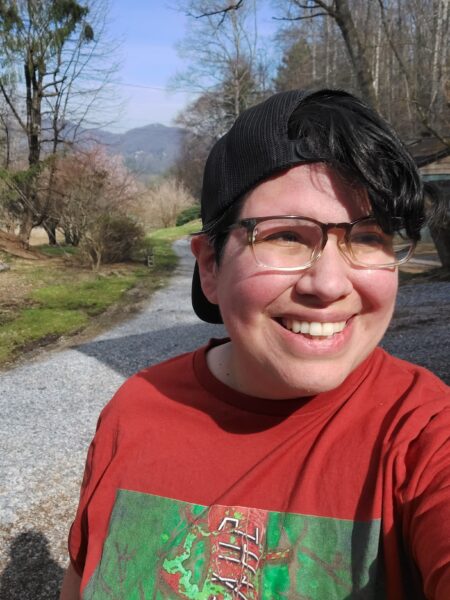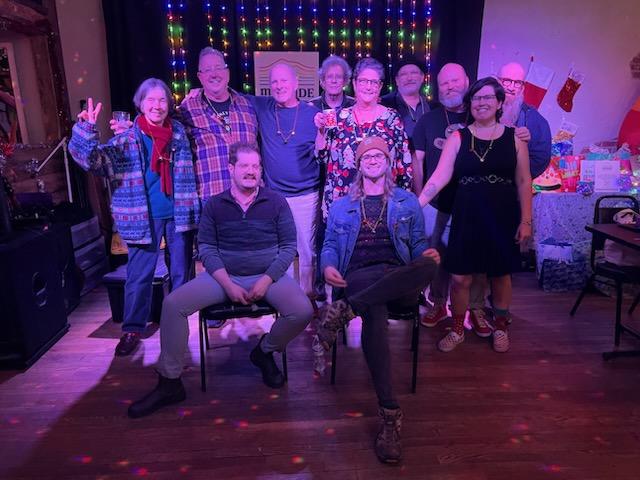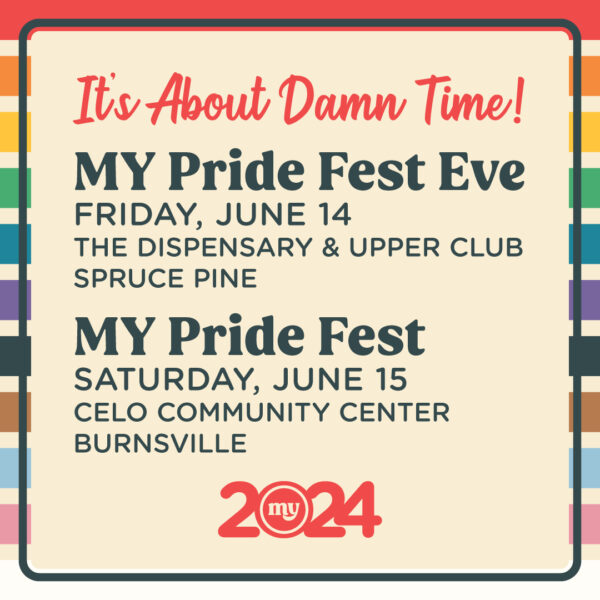For many queer and transgender people, growing up without having a community is nothing new. Like so many, the lack of visibility in queer and transgender representation tends to leave one feeling hopeless and alone. A study by the Search Institute found that LGBTQ+ people are more likely to experience gaps within their developmental relationships and feelings of belonging than non-LGBTQ people.
Across the country, LGBTQ+ people are experiencing an unprecedented number of attacks. With more than 500 anti-LGBTQ+ bills introduced in 2023 – spanning from anti-transgender bathroom restrictions to attempts to ban or restrict access to medically necessary healthcare to anti-LGBTQ+ curriculum censorship policies – it is now more important than ever for LGBTQ+ people to come together and surround one another with encouragement. Today, many organizations and groups are working together to champion and uplift queer and transgender people, especially those here in the South where anti-rhetoric and legislation are running rampant.

For Nicole Rogers (they/them pronouns) a founding member of Queer Solidarity WNC, the ongoing trials and tribulations facing the LGBTQ+ community could not go unfaced. At its core, Queer Solidarity WNC (QS) is a multi-generational, multicultural, non-partisan group that works to address local issues through the queer lens and heal divisions between local offices and residents through empowerment and community building. For Rogers, seeing the lack of queer representation regarding local LGBTQ+ issues is something that they found troubling and wanted to help change. “Prior to QS being formed, there was no voice or consistently safe space for queer folks to engage in local activism regarding LGBTQ+ issues,” Rogers said. “Up until our formation, it was just us hoping that groups would speak on our behalf,” said Rogers.
Based out of the Yancey and Mitchell County areas in North Carolina, the organization has been operating since the later half of 2023. The group was initially created in response to anti-LGBTQ+ pushback that their local library received for its June pride month display. Similar to many states that are working to ban books, Yancey County officials have attempted to censor a range of books, including those that deal with racial justice or LGBTQ+ identity. Additionally, the county officials have also tried to censor LGBTQ+ displays as well who can use public meeting spaces at the library. Both LGBTQ+ and ally community members have made public comments on the library’s impact, which has served as a safe space, especially for those struggling with their mental health.

During the summer of 2023, local officials attempted to pull the Yancey County Library out of the AMY Regional Library System but were informed that in 2021, they signed a 10 year contract keeping them in the system until 2031. They have since attempted to change the library bylaws and have appointed seven new Yancey County Library board members without responding to the board member appointment requests the library staff had sent them over the past two years, or consulting Yancey County or AMY Regional library staff about their selections. Additionally, they appointed all 3 Yancey County representatives to the Regional Library Board, which the bylaws state should be done by the Yancey County Library board chair and members rather than county officials. The new board members include a community member who made public comment at the June County Commission meeting regarding her concerns about a Pride Display, two others who made public comment at commissioner’s meetings since July in support of the Commissioners’ decisions regarding the library, and Michelle Presnell, a former Republican member of the NC General Assembly who was named a ‘champion’ of the NC Values Coalition Scorecard, and in 2016 introduced the egregious anti-transgender bill HB2, known widely as ‘the bathroom ban.’
Throughout the winter and spring of 2024, the new library board members continued to focus on books and materials policy, display policy, and concerns about children being able to access ‘pornography’ through adult section books and graphic novels, as well as, through online resources such as Libby. The lack of local journalism has hindered the ability of residents to amplify their concerns about the continued efforts by the new board members as Asheville journalists stopped covering the situation in the fall. “Again, leaving us to stand for and with each other here in the mountains regardless of when interest waxes and wanes from our closest city who do what they can to support us” says Rogers.
Rogers understands the importance of utilizing one’s voice in the face of intolerance. Prior to their role now, Rogers worked as a social worker where they received training that helped expose them to different worldviews. “Before this time, I had no idea what it meant to be white passing. As a queer, Latinx nonbinary-person, I never fully realized that I was white presenting before,” Rogers said. “To my white counterparts, I looked just like them. So having the language to understand this and also understand what a privilege this is opened my eyes to so many things.”
Due to their experience as a social worker, Rogers has learned to hold empathy for the people around them with opposing worldviews. “We have all been misinformed at times, and have been raised in a culture that includes inherent biases that we must reflect on and decide if they are beliefs we want to hold onto or re-evaluate.” Rogers said. “This is a large part of why the work we do focuses on healing the community and creating a thriving county that is accessible for all through education and kindness as opposed to targeting individuals for religious or political beliefs.”
We have all been misinformed at times, and have been raised in a culture that includes inherent biases that we must reflect on and decide if they are beliefs we want to hold onto or re-evaluate.This is a large part of why the work we do focuses on healing the community and creating a thriving county that is accessible for all through education and kindness as opposed to targeting individuals for religious or political beliefs.
One of the most memorable training sessions they received came from Dr. Kenneth V. Hardy. A key quote that has resonated with them over the years has ultimately guided them in their efforts for community building. Since Rogers first heard Dr. Hardy’s words, “until you feel the weight of your privilege, you are not wielding it to create change,” they have attempted to make this their mantra. “This has played a pivotal role in how I became the activist that I am today. It serves as a reminder that we all have a collective responsibility to respond to issues that upset us,” Rogers said.
Since then, it has helped Rogers continue advocating in their new area despite fears of retaliation for being visibly queer or participating in advocacy within the community. Through their work, Rogers does not want to be the face or representation of QS, but rather wants to spread empowerment and amplify the queer community’s needs and concerns.
Having learned and acquired language necessary to confront tough conversations, Rogers felt compelled to do more. In the summer of 2020, when conversations centered on racial injustice were at an all-time high, Rogers learned just how important advocacy and community can be. They engaged in robust conversation with a trusted friend exploring the impact of racial and systemic oppression on vulnerable communities. The support and informal education allowed them to engage in difficult conversation with friends and family. From this experience, Rogers was able to realize the importance of support systems and address conversations on race that they had never had before. “For me, community truly is the basis for everything,” they said. “By being a great advocate, I can be an even better community member to those around me. Getting to connect with friends and discuss important issues is vital to understanding things we may not yet be knowledgeable about.”
For me, community truly is the basis for everything. By being a great advocate, I can be an even better community member to those around me. Getting to connect with friends and discuss important issues is vital to understanding things we may not yet be knowledgeable about.
For many LGBTQ+ people, especially LGBTQ+ youth, the closest source of community comes from online relationships. The New York Times reported that social media usage for LGBTQ+ youth often serves as a lifeline for those who grow up in unwelcoming or unsupportive environments. This newfound access to community, which was once unavailable for older generations, now removes the myriad barriers to connection.

But even with online communities, some prefer the tangibility of communing with friends. That’s what Rogers discovered when they first moved to the Yancey-Mitchell area – how disconnected they felt from finding LGBTQ+ people. “It was not that the community was not present, it was that we just did not have a regular meeting space to run into new queer people or a sense of safety and connectedness to bring us together in person rather than online,” they said.
Having moved to the area in 2021 with a chronic illness limited Roger’s access to find community. Since they were unable to go out and meet people similar to how able-bodied individuals are familiar with, Rogers is reminded of the kindness they experienced from local vendors at the county’s weekly farmers/artisan market that took place over the summer months. “These few people were some of the first individuals that I met when I first moved here,” Rogers said. “One queer artist, Carew Henry, made them a necklace, which they continue to wear as a show of their resilience in their effort to create a more equitable community experience for all residents. “I wear this necklace as a show of resilience and as a reminder to myself why I do the work that I do.”
It was at this same market that Rogers met a local farmer, Rachel Haimowitz of Healthy Plan(t)et Homestead. Since then, Haimowitz has now begun partnering with QS to create a donation based CSA membership for library staff as a token of appreciation for their hard work and protection of vulnerable communities.
After living in the area for a year and a half, Rogers went to a local LGBTQ-inclusive Pride month event – sponsored by MY Pride, a local LGBTQ+ nonprofit focused on celebrating and supporting local LGBTQ+ people with fun and educational events. This was a space where they could find companionship in others with similar lived experiences. But while they were eager to find community, they were fearful of possible safety concerns, especially since they were in such a small, rural community. Having grown up in New York and been to other larger and more openly affirming LGBTQ+ spaces, this was the first time where Rogers had to question whether or not this would put them in harm’s way. Unfortunately, many LGBTQ+ Southerners experience violence; a report from the Campaign for Southern Equality found in a 2019 study that nearly 22 percent of all participants reported experiencing physical violence, while 77 percent reported experiencing verbal or emotional violence due to their identity. Some residents have shared similar fears with Rogers.

And while the possibility of violence remains a worry for many LGBTQ+ people, Rogers believes that even in spite of fear, LGBTQ+ people must not turn away. With community, LGBTQ+ people are more capable to stand up against intolerance and lean on one another for support. “At the end of the day, community-building is an essential piece for those of us in rural living,” they said. “By collaborating together, we can rebuild communities that feel left behind and further work on ways to thrive collectively as a country regardless of what politics may be pushing.”
At the end of the day, community-building is an essential piece for those of us in rural living. By collaborating together, we can rebuild communities that feel left behind and further work on ways to thrive collectively as a country regardless of what politics may be pushing.
But while the road may be long, Rogers understands just how pivotal holding space for community can be. For them, they look at the adversity of the library situation as having led to creating a positive impact for them and for other LGBTQ+ members within the community.
“Because of all that has happened, I have been able to find and be surrounded by a vibrant community,” Rogers said. “I would have never known that such a diverse LGBTQ+ community resided here had it not been for us all wanting to use our collective voices to come together and promote tolerance and acceptance of all members of our community.”
I would have never known that such a diverse LGBTQ+ community resided here had it not been for us all wanting to use our collective voices to come together and promote tolerance and acceptance of all members of our community.
Having experienced firsthand how finding community impacted themselves and allowed them to find their voice, they hope to continue doing the same for others. It is their hope and optimism that reflects the very spirit of what it means to be a part of the LGBTQ+ community – a community that remains resilient in the face of opposition, despite the hurdles along the way continues to show up and remain steadfast in creating a safe world for all. This is the very essence of community, and like Rogers and so many before them, we must never stop in trying to unify and uplift one another.

